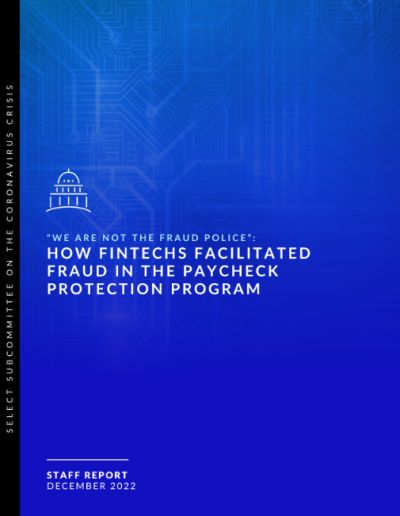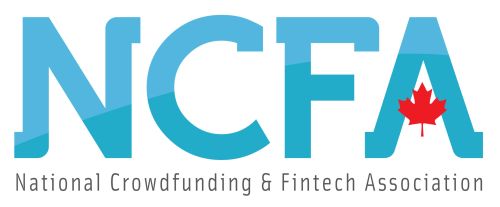US Subcommittee on Covid Releases Staff Report: How Certain Fintechs Facilitated Fraud in the Paycheck Protection Program
US House Subcommittee on Covid | Release | Dec 1, 2022
 Today, the Select Subcommittee on the Coronavirus Crisis, chaired by Rep. James E. Clyburn, released a staff report detailing the poor performance of many financial technology companies (fintechs) in administering the nation’s largest pandemic relief program, the Paycheck Protection Program (PPP)—may have themselves committed PPP fraud
Today, the Select Subcommittee on the Coronavirus Crisis, chaired by Rep. James E. Clyburn, released a staff report detailing the poor performance of many financial technology companies (fintechs) in administering the nation’s largest pandemic relief program, the Paycheck Protection Program (PPP)—may have themselves committed PPP fraud
- In May 2021, the Select Subcommittee initiated an investigation into the role of fintech companies Kabbage, Inc. and Bluevine and partner banks Cross River Bank and Celtic Bank in facilitating PPP fraud following public reports they were linked to disproportionate numbers of fraudulent loans. The investigation was expanded in November 2021 to include fintech start-ups Blueacorn PPP, LLC, and Womply, Inc., after an analysis determined significant percentages of PPP loans facilitated by the companies had indicators of fraud.
- The investigation was expanded in November 2021 to include fintech start-ups Blueacorn PPP, LLC, and Womply, Inc., after an analysis determined significant percentages of PPP loans facilitated by the companies had indicators of fraud.
See: Consumer Protection: Fintech Complaints Have Been Rising
Chairman Clyburn released the following statement about today’s report:
“As today’s report details, many fintechs, while promising to help disburse billions of Paycheck Protection Program dollars to struggling small businesses efficiently and expeditiously, refused to take adequate steps to detect and prevent fraud despite their clear responsibility to safeguard taxpayer funds. Even as these companies failed in their administration of the program, they nonetheless accrued massive profits from program administration fees, much of which was pocketed by the companies’ owners and executives. On top of the windfall obtained by enabling others to engage in PPP fraud, some of these individuals may have augmented their ill-gotten gains by engaging in PPP fraud themselves.
“We must learn from this inexcusable misconduct to erect guardrails that will help ensure that federal programs—including emergency assistance programs in future crises—are administered more effectively, efficiently, and equitably while keeping waste, fraud, and abuse to an absolute minimum. Based on our initial findings, I have asked the SBA and SBA OIG to conduct further investigation into these companies and pursue all appropriate remedies, and I have informed DOJ that some of our findings may warrant its attention.”
See: UK Alternative Lenders Funding Delivery Performance to Small Businesses During COVID
- Today’s staff report is entitled “‘We Are Not the Fraud Police’: How Fintechs Facilitated Fraud in the Paycheck Protection Program” and is available in full here. The report reveals the following key findings: Fintechs and Lenders Observed Significant Fraud in the PPP, Which They Attributed to Program Mismanagement as They Sought to Evade Responsibility
- Blueacorn Took Only Minimal Steps to Prevent Fraud in Its Facilitation of Billions of Dollars in PPP Loans, While Abusing the Program to Enrich Its Owners
- Womply’s PPP Fraud Screenings Failed to Prevent “Rampant Fraud”—and Were Accompanied by Questionable Business Practices—Despite Generating Over a Billion in Profits
- Capital Plus, Harvest, and Other Fintech-Partnered Lenders Conducted Little Oversight over Womply and Blueacorn’s Activities, Allowing Fraud to Infiltrate The PPP
- Kabbage’s PPP Activities Illustrate that the PPP Lacked Incentives for Fintechs to Implement Strong Fraud Prevention Controls or Appropriate Borrower Servicing
- Bluevine Initially Faced Significant Fraud Rates, but Its Longstanding Partners Intervened to Improve Fraud Prevention Over the Course of the Program
- Based on the findings, the report includes 11 recommendations to address PPP fraud and improve future programs.
- It urges the SBA to consider carefully whether businesses like fintechs that are not subject to traditional financial regulations should be permitted to play a part in future federal lending programs, and recommends that Congress take these factors into account in considering future legislation.
View the original release –> here
Download the 130 page PDF full Staff Report –> here
 The National Crowdfunding & Fintech Association (NCFA Canada) is a financial innovation ecosystem that provides education, market intelligence, industry stewardship, networking and funding opportunities and services to thousands of community members and works closely with industry, government, partners and affiliates to create a vibrant and innovative fintech and funding industry in Canada. Decentralized and distributed, NCFA is engaged with global stakeholders and helps incubate projects and investment in fintech, alternative finance, crowdfunding, peer-to-peer finance, payments, digital assets and tokens, blockchain, cryptocurrency, regtech, and insurtech sectors. Join Canada’s Fintech & Funding Community today FREE! Or become a contributing member and get perks. For more information, please visit: www.ncfacanada.org
The National Crowdfunding & Fintech Association (NCFA Canada) is a financial innovation ecosystem that provides education, market intelligence, industry stewardship, networking and funding opportunities and services to thousands of community members and works closely with industry, government, partners and affiliates to create a vibrant and innovative fintech and funding industry in Canada. Decentralized and distributed, NCFA is engaged with global stakeholders and helps incubate projects and investment in fintech, alternative finance, crowdfunding, peer-to-peer finance, payments, digital assets and tokens, blockchain, cryptocurrency, regtech, and insurtech sectors. Join Canada’s Fintech & Funding Community today FREE! Or become a contributing member and get perks. For more information, please visit: www.ncfacanada.org
Related Posts
- SEO Powered Content & PR Distribution. Get Amplified Today.
- Platoblockchain. Web3 Metaverse Intelligence. Knowledge Amplified. Access Here.
- Source: https://ncfacanada.org/us-subcommittee-on-covid-releases-staff-report-how-certain-fintechs-facilitated-fraud-in-the-paycheck-protection-program/



